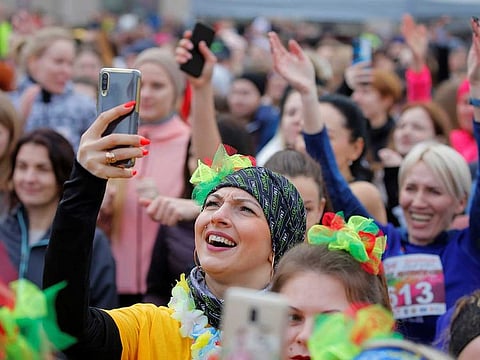Women continue to be key partners in peacemaking
Twenty-two years on, have we made progress with Women, Peace and Security (WPS) agenda?

Today is the last day of the International Conference on Women, Peace and Security (WPS), a global gathering of policymakers, diplomats, activists and academics that took place for the first timein the United Arab Emirates (UAE) over the last three days.
The conference echoed what many countries, international agencies — namely, the United Nations (UN) — civil society organisations and scholars have been saying for a long time: we need more women around the negotiation and peacemaking table, on the ground as peacekeepers, in local communities as organisers and as active participants of change in the security sector.
Women make up half of the world’s population, but only represent three per cent of mediators and 13 per cent of negotiators in peace talks since the mid-1990s until 2018. The conference served as a firm call to action and a solid reminder that women must be an integral part of the security landscape to achieve peace.
Women in conflict
When we talk about women in conflict, the tendency has always been to see women and girls as victims. Indeed, conflicts have violent, dangerous and devastating effects on women and girls around the world. In addition to death, disease, displacement, poverty, physical insecurity and gender-based violence, wars leave permanent and insurmountable obstacles to women’s well-being.
Such impacts include but are not limited to a decline in their access to education, labour force participation, political representation, community safety and legal rights. In countries where discrimination against women was rampant even before the eruption of war, the chaos and destruction that conflict causes leads to an increase in all forms of violence and abuse against women.
Championed by UN Security Council (UNSC) resolution 1325 in the year 2000, a focus of the WPS agenda was to shift that narrative and to consider women as key partners in conflict-resolution and peacemaking. The UNSC subsequently passed 11 resolutions on WPS in the 2000 — 2022 period, all highlighting the devastating impact of war on women and girls yet emphasising their right and capacity to participate in the prevention of conflict, in peacemaking and peacebuilding efforts.
WPS agenda
What the WPS agenda advocates is a comprehensive engagement of women at all levels to find permanent and sustainable solutions that can ensure a lasting peace. The historical data is there: any peace agreement is 35 per cent more likely to last at least 15 years if women participate in the negotiation and implementation processes. In other words, when women participate in peace talks, peace lasts.
And yet, 22 years after the seminal UNSC1325 resolution was passed, have we made much progress? According to the Georgetown University Institute for Women, Peace and Security Index of 2021 — 2022, a global index that covers 170 countries and measures women’s inclusion, security and justice levels across 11 indicators, progress has slowed since 2017 with many places witnessing worse scores.
The Middle East and North Africa (MENA) region is specifically highlighted for its dangerous levels of organised violence, discrimination and low rates of inclusion. It is the worst performing region when compared to others. Indeed, only seven Arab countries have adopted National Action Plans (NAPs) for WPS: Iraq (in 2014), Palestine (2017), Jordan (2018), Tunisia (2018), Lebanon (2019), Yemen (2019) and the UAE (2021).
In 2021 — 2022, the UAE came in 22nd place globally on the WPS Index — on par with Australia — and is the highest ranked country in the MENA region when it comes to WPS indicators. The UAE achieved that score not because it has a NAP for WPS — indeed, the UAE NAP was adopted recently in March 2021 — but because of two overlapping elements: the absence of conflict and the proactive and continuous legal and socioeconomic empowerment of Emirati women.
Women empowerment and UAE
The country’s commitment to women empowerment has spilled over into the foreign policy realm: the UAE committed more than $2 billion since 2016 to various programmes related to the protection of women in more than 70 countries.
Since 2019, through the Sheikha Fatima Bint Mubarak WPS Initiative, the UAE has trained more than 350 female cadets from 18 countries for various military and peacekeeping roles. Following the adoption of its NAP in 2021, and as the UAE took its seat on the Security Council for the 2022 — 2023 period, it committed to making WPS a key foreign policy priority.
Beyond the UAE, the worst performers in the bottom quintile of the WPS Index include Syria, Yemen, Iraq, Palestine, Sudan and Libya. And yet, Iraq, Palestine and Yemen have all committed to the WPS agenda and adopted their own NAPs — but it does not seem to have made much of a difference.
This begs the question: is having a national action plan to achieve the WPS agenda enough? As of August 2022, 103 countries have a NAP on WPS but only 35percent of these states have allocated budgets to ensure the implementation of their NAPs. Without firm financial commitments, NAPs will simply not hold.
In addition to that, and when we think back on the worst performing countries on the WPS Index, the picture is clear: war and chaos will continue to impede any significant advancement in women’s rights.
Without an immediate cessation of conflict — as lofty and idealist as this may sound — any commitment to the WPS agenda is at best a nice sound bite. And without sustainable socioeconomic empowerment programmes that run in parallel to women’s increased representation in the political and security sectors, progress on achieving UNSC1325 will continue to be uneven and slow.
Dr Sara Chehab is a faculty member at the Anwar Gargash Diplomatic Academy (AGDA).



